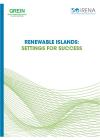

Renewable islands: Settings for success
Newsletter
Islands around the world rely on costly fossil-fuel imports, often from distant locations, which can burden government budgets and inhibit investment in social and economic development. A transition to indigenous renewable energy, however, can reduce import dependence and create important business and employment opportunities.
Renewable Islands: Settings for Success identifies four key factors for successful deployment of renewable energy on islands: political will, as embodied in legislation; technical planning to ensure that renewables are added to the grid in a reliable and cost-effective fashion; market frameworks allowing competition by independent power producers and building owners, along with the main power utility; and development of human capacities to plan, install, operate and maintain renewable power facilities.
The report – prepared by the International Renewable Energy Agency (IRENA) in support of the Global Renewable Energy Islands Network – offers case studies from the Islands of Cabo Verde, Cyprus, Fiji and Samoa, where governments have succeeded in lowering energy costs by scaling up renewables.




